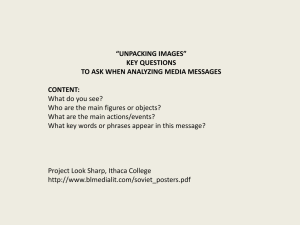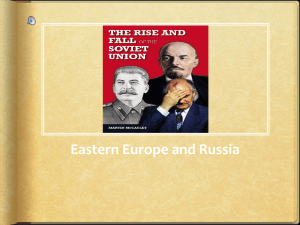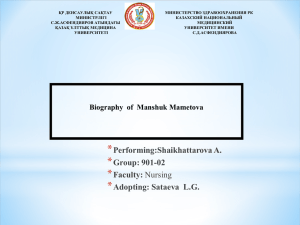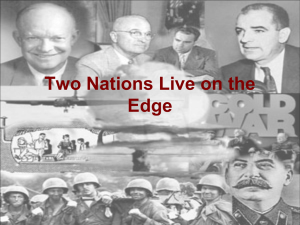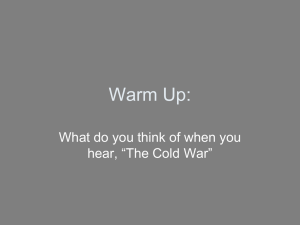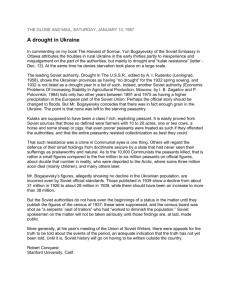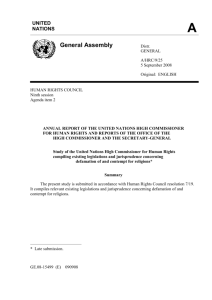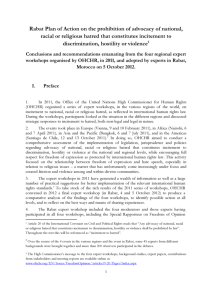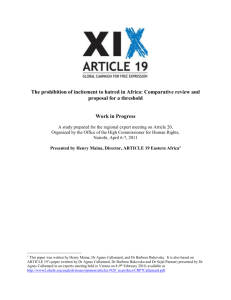Bratislava
advertisement
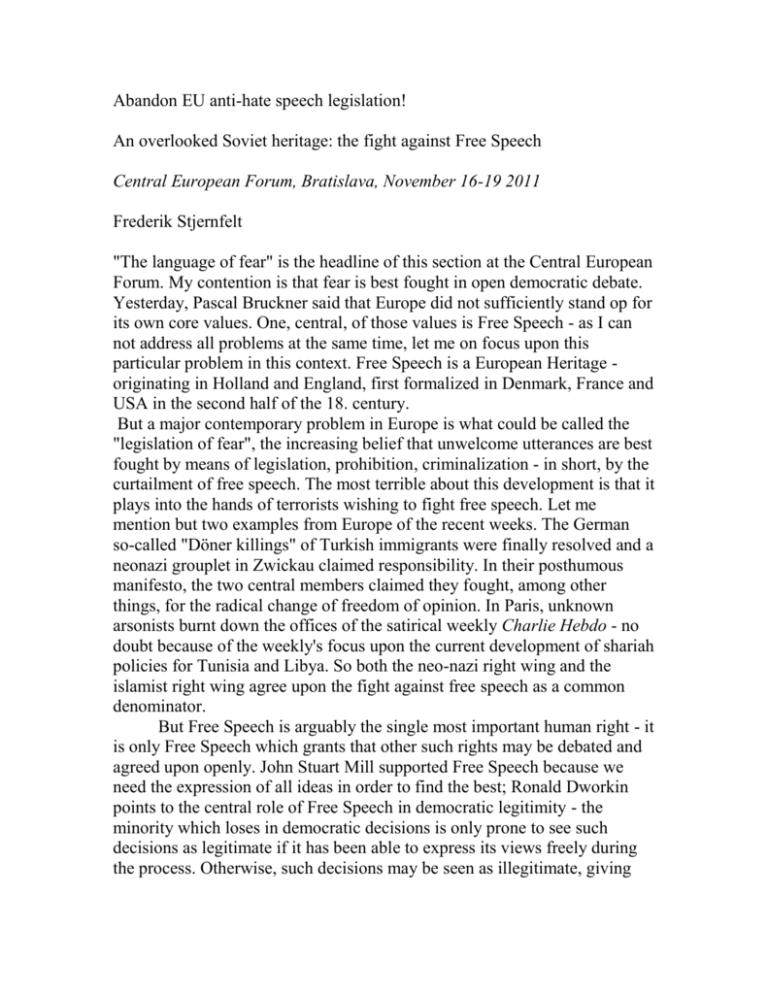
Abandon EU anti-hate speech legislation! An overlooked Soviet heritage: the fight against Free Speech Central European Forum, Bratislava, November 16-19 2011 Frederik Stjernfelt "The language of fear" is the headline of this section at the Central European Forum. My contention is that fear is best fought in open democratic debate. Yesterday, Pascal Bruckner said that Europe did not sufficiently stand op for its own core values. One, central, of those values is Free Speech - as I can not address all problems at the same time, let me on focus upon this particular problem in this context. Free Speech is a European Heritage originating in Holland and England, first formalized in Denmark, France and USA in the second half of the 18. century. But a major contemporary problem in Europe is what could be called the "legislation of fear", the increasing belief that unwelcome utterances are best fought by means of legislation, prohibition, criminalization - in short, by the curtailment of free speech. The most terrible about this development is that it plays into the hands of terrorists wishing to fight free speech. Let me mention but two examples from Europe of the recent weeks. The German so-called "Döner killings" of Turkish immigrants were finally resolved and a neonazi grouplet in Zwickau claimed responsibility. In their posthumous manifesto, the two central members claimed they fought, among other things, for the radical change of freedom of opinion. In Paris, unknown arsonists burnt down the offices of the satirical weekly Charlie Hebdo - no doubt because of the weekly's focus upon the current development of shariah policies for Tunisia and Libya. So both the neo-nazi right wing and the islamist right wing agree upon the fight against free speech as a common denominator. But Free Speech is arguably the single most important human right - it is only Free Speech which grants that other such rights may be debated and agreed upon openly. John Stuart Mill supported Free Speech because we need the expression of all ideas in order to find the best; Ronald Dworkin points to the central role of Free Speech in democratic legitimity - the minority which loses in democratic decisions is only prone to see such decisions as legitimate if it has been able to express its views freely during the process. Otherwise, such decisions may be seen as illegitimate, giving rise to extremism, rightly claiming that certain viewpoints are excluded from debate. Why on Earth, then, should it be the official EU policy to support such curtailment of free speech? Indeed, the fateful day of November 28 2008, the Framework Decision of EU named "Combating Racism and Xenophobia" was adopted, obliging all EU member states to criminalize certain forms of so-called "hate speech" - thus distancing the political development of Europe from that of the US where the protection of free speech of the First Amendment is increasingly strengthened by the Supreme Court. The evident problem in such developments is that "hate speech" is a notoriously fluffy concept which makes such legislation prone to be exploited for political purposes of all sorts. What is known by few people is that this unlucky development is a piece of heritage from the Soviet Union. In the original formulation of the UN Declaration of Human Rights from 1948, no such delimitations of Free Speech were claimed - even if they were widely discussed in the preparatory committees of that Declaration. Already back then, the Soviet Union continuosly suggested additional paragprahs with the purpose of prohibiting expressions of "intolerance", backed by countries like Yugoslavia and, more surprisingly, France - while the US and UK consistently fought any such limitations to free speech. Twenty years later, however, the Western powers were already outvoted in their support of free speech. In the adoption of the International Covenant on Civil and Political Rights (ICCPR, 1966) in the UN General Assembly, the free speech Article 19 was followed by no less than an obligation of the member countries to prohibit hate speech in Article 20. The ICCPR was ratified by some 167 states and, unlike the 1948 Declaration, legally binding. The infamous Article 20 went: "Any advocacy of national, racial or religious hatred that constitutes incitement to discrimination, hostility or violence shall be prohibited by law." The adoption of this article was strongly controversial and was only reached after long and heated negotiations. Now, the Soviet enmity against Free Speech was supported by the Eastern bloc along with many third world countries. The Western countries were willing to accept a prohibition of "incitement of violence", but the Soviet Union wanted more than that, and a Soviet-Polish proposal that addressed, more broadly, "hatred" and "hostility" as such. Eleanor Roosevelt found such expressions in legal texts "extremely dangerous" and cut right to the center of the problem when she warned against articles “likely to be exploited by totalitarian States for the purpose of rendering the other articles null and void”. She feared such a paragraph ”would encourage governments to punish all criticism under the guise of protecting against religious or national hostility”. The UK representative claimed that “the power of democracy to combat propaganda lay … in the ability of its citizens to arrive at reasoned decisions in the face of conflicting appeals” and added, aimed at the Soviet representative, that Hitler's Mein Kampf had not been banned in the UK even during WWII. He concluded that his government “would maintain and fight for its conception of liberty as resolutely as it had fought against Hitler”. Sadly, the UK would give up this stance, and under Tony Blair, the UK would discuss and adopt laws radically curtailing Free Speech. In the UN general assembly, Article 20 of ICCPR was adopted with votes from the Communist Eastern block along with countries with questionable human rights records like Saudi Arabia Haiti, Sudan, and Thailand - while Western liberal democracies voted against, notably supported by countries such as Malaysia and Turkey. The bottom line is that the origin of international hate-speech criminalization in human rights law lies with a series of states where criticisms of their totalitarian governments and the propagation of democrary were criminalized. Some important lessons can be learnt from this piece of history. One, of course, is that legislation against hate speech forms an overlooked piece of Soviet ideology. Another, remarkably, is that such legislation can easily be misused to prohibit the expression of points of views that states more generally wish to avoid. A third lesson is that such legislation does not remove the "hatred" which it explitly addresses, but may even have quite the opposite effect. This paradox can be seen from the example of Yugoslavia, the theatre of the most recent European genocide and a country which was a strong supporter of anti-hate speech legislation already in 1948 and which also supported the 1966 decision. Article 134 of the Yugoslav criminal code in early 1990s punished with up to ten years imprisonment the person who “incites or fans national, racial or religious hatred or discord between peoples and nationalities”. The law was scrupulously followed in Yugoslavia where a harmless ethnic joke was sufficient to provoke very serious prison punishments. As is well know, many decades of such jurisprudence did not prevent large-scale ethnic cleansing and genocide in the early 1990s and it is fair to ask if not the Yugoslav hate speech legislation prevented the open discussion of interethnic issues, thereby fanning ethnic hatred rather than combating it. The strange thing is that despite the Western European fight against Article 20 of the ICCPR in the mid-60'es, hate-speech legislation enjoyed a significant increase in Western Europe during the 1970s - following the recommendations of the ICCPR. After 1989 and the disapperance of Soviet power you might have expected that European support to this old piece of totalitarian Soviet heritage might have vanished - but now a new faction of countries in international organizations was ready to take over the role of the Communist bloc - that of the OIC, the Organization of the Islamic Conference. In the Cairo Declaration of Human Rights adopted by the OIC in 1990, UN human rights were explicitly placed under the sharia as a source of legislation, and regarding Free Speech in particular, its Article 21 stated that “everyone shall have the right to express his opinion freely in such manner as would not be contrary to the principles of the Shari’ah.” The OIC initially claimed Free Speech must never give free rein to blasphemy, and from around the millenium, the organization intoned a coordinated policy in UN organizations like the Human Rights Commission/Council and, after 2005, the General Assembly in an attempt to introduce criminalization of so-called "defamation of islam" or, more generally, "defamation of religions" as additional human rights. During the first decade of the the 2000's, such declarations were passed every year by a majority of OIC and third-world countries - and with increasingly severe demands to make criminalization of such defamation an obligation of UN member countries, to make UN special rapporteurs scrutinize the legislations of each member state to establish whether all member states did in fact obey the resolutions. Even if keeping the majority, such resolutions have steadily lost votes over the recent eight years, and this year, the OIC seems to be changing strategy in order to support and extend existing anti-hate speech legislation based on the ICCPR Article 20 in the West. Thus, the most recent resolution in the HRC refers to the wording of this article - adding even more vague crimes such as “derogatory stereotyping, negative profiling and stigmatization of persons based on their religion or belief”, just like it “deplores any advocacy of discrimination . . . on the basis of religion or belief.” This gives the parodical consequence that many OIC states may now file complaints against European democraries during the Universal Periodic Review of the member states in the HRC. Thus May 2nd 2011, Egypt, Indonesia, Malaysia, Bangladesh and Pakistan complained that Danish hate-speech laws were not enforced to a sufficient degree - countries with no impressive human rights record. In the long perspective of world politics since 1945, then, the pressure against free speech in international legislation has originated steadily from non-democratic countries, first the Soviet bloc and more recently the OIC. It is a strange tragedy, then, that the EU should accept, in the 2008 Framework Decision, this "poisonous legacy of totalitarianism", as the Danish human rights lawyer Jacob Mchangama has called it. Democratic core countries like England (2006) and Norway (2009) have even gone very far in the direction of adopting even harsher legislations, including shockingly vague new crime types like defamation without intention on the part of the perpetrator. Such legislation was only avoided at the price of deep divisions within the labour parties of those countries. Unlike the case in the 60's, the totalitarian fight against free speech in international legislation is now supported by a new pressure stemming from violent radicalists and terrorists in the street. Recurrent religious pressure and terror attacks against publishers, newspapers, writers, journalists, translators, draughtsmen etc. now form a militant support to the legal struggle within international organizations. And right wing terrorists like Anders Breivik in Norway or the Zwickau group in Germany also demand curtailment of Free Speech. This is why it is due time for Europe to step back from the 2008 Framework Decision and cancel the attempt to enforce anti-hate speech legislation upon the member states. Two alternative courses of action are present - one would be the restriction of hate-speech legislation to cover only threats and incitement to violence - not the whole bundle of more vague "crimes" like defamation, offense, hatred, stereotyping, hostility, mockery, ridicule and so on and so on - which should not be seen as crimes but rather as unavoidable aspects of free debate. The other course of action possible, of course, is the abolition of hate-speech and blasphemy legislation altogether. This is not to say that I applaud all uses of Free Speech. Quite on the contrary, I find many cases of Free Speech use quite appalling. But such uses should be criticized in open debate rather than criminalized by law. This has several reasons: 1) criminalization of certain viewpoints radicalize the holders of such viewpoints more probably than it makes them change their mind; 2) the state - and other sources of authority like terrorists - will always be prone to misuse such legislation once it is there, so that, all in all, 3) such legislation will entail worse effects than the harsh language it was aimed to reduce. So my answer to the issue of "language of fear" is the recommendation to Europe to get rid of this Soviet heritage, this "legislation of fear". It increases fear and incites terror rather than the opposite. Ref. The history of modern European anti-hate speech legislation, see Jacob Mchangama, Policy Review No. 170 December 2011/January 2012
